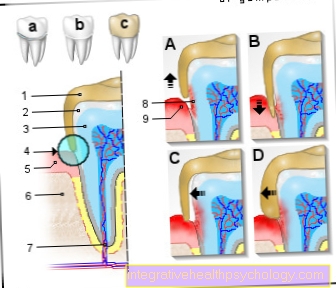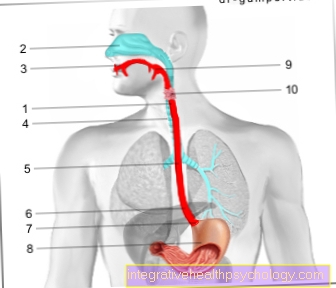Care levels and care levels
What levels of care are there?
The care levels have been in effect since 01.01.2017 through the second Care Strengthening Act (PSG II) and make it easier for people in need of care to actually be classified as in need of care in order to receive benefits from the care fund. The change from 3 levels of care to 5 levels of care was primarily about assigning the need for care to people who have dementia, are mentally ill or mentally handicapped and have limited everyday skills.
There are care levels 1 to 5. The level of care you receive is determined based on the new assessment assessment (NBA). The more points you get in it, the higher the level of care to be obtained.

Care level 1 applies to people with a minor impairment of independence.
In the event of a significant impairment, care level 2 applies.
People with a severe impairment of independence are assigned to care level 3 and people with the most severe impairment are assigned to care level 4.
Care level 5 provides help to people who suffer from the most severe impairment in everyday life and who have special requirements for care.
Care level 1
The new care level 1 has existed since January 01, 2017 and is assigned to people in need of care who have not previously had a care level.
Since the former care level 1 was transferred to care level 2, care level 1 is completely new. As a result, no level of care corresponds to it. It is primarily used to help patients with dementia. In order to receive care level 1 from the MDK reviewers, those affected must receive a score of 12.5 to <27 in the new review assessment. This calculates the number of points based on various modules such as
- mobility
- cognitive and communication skills
- Behaviors
- mental difficulties
- Self-sufficiency
- Coping with disease or therapy-related stress
- Design of everyday and social life.
Care level 1 corresponds to a slight impairment of independence, regardless of whether it is physical or mental.
People with care level 1 do not receive any care allowance for care at home, neither care benefits in kind nor outpatient cash benefits. What they receive is a “earmarked outpatient relief amount” of € 125 per month. This amount is mainly used to finance the care, supervision and guidance of those in need of care for day-structuring measures.
You will find more information on this topic here: The new care level 1 - you have to pay attention to this
Care level 2
Affected persons in need of care with a "significant impairment of independence" and people who were previously assigned to care level 1 receive care level 2. For the experts, a score of 27 to 47.5 applies in the new assessment assessment.
Those in need of care receive a monthly care allowance of € 316 if they are cared for at home by relatives. In addition, there are long-term care benefits of € 689 per month, which are settled directly by the outpatient care services with the care funds themselves.
This means that those affected, with or without dementia, receive significantly more care allowance and benefits in kind than in the former care tier system.
In addition, there is the new, uniform “relief contribution” of € 125 per month, with which those in need of care can pay for household help, an everyday companion, shopping help or a care group, for example. If short-term care (e.g. in a nursing home) is required after a hospital stay, the nursing care funds pay subsidies up to a maximum of € 1,612 per year for up to four weeks.
Care level 3
Insured persons with a “severe impairment of independence” and people with dementia with previous care level 1 and people with care level 2 are awarded care level 3. In the NBA of the MDK, the number of points to be achieved for care level 3 is between 47.5 and 70 points.
Those in need of severe care receive a monthly care allowance of € 545 with home care by relatives and care benefits in kind by an outpatient care service of € 1,298 per month. In addition, there is the mentioned relief contribution of € 125 per month for household help, shopping help or the like.
Get more detailed information about the Care level 3.
Care level 4
Care level 4 describes a “most severe impairment of independence” for those in need of care. The requirement is a score between 70 and 90 points in the NBA of the MDK. In addition, all those in need of care who are assigned to care level 3 or care level 2 with limited everyday skills are automatically transferred to care level 4.
Those affected receive a monthly care allowance of € 728 with home care by relatives and care benefits in kind by an outpatient care service of € 1,612 per month. In addition, there is a relief contribution of € 125 per month for a care group, everyday support, domestic help or the like.
Care level 5
Care level 5 is the highest level of care with the most extensive care insurance benefits. This helps people with "the most severe impairment of independence" and who are particularly in need of care. In order to obtain this level of care, 90 to 100 points are required in the NBA. This corresponds to people who previously received care level 3 with limited everyday skills, the colloquial "hardship cases".
Affected persons with care level 5 receive € 901 per month for home care by relatives or friends and care benefits in kind of € 1,995 for care by an outpatient care service. They also receive the monthly relief contribution of € 125 for household help, everyday carers or the like.
You will find more information on this topic here: Care level 5
Which care levels are there?
Until 2016, care levels 0 to 3 were in effect in Germany. In 2017, these were replaced by care levels that assign more people the need for care.
Care level 0 is used more colloquially and is not explicitly mentioned in the Care Insurance Act (SGB XI). Care level 0 includes all those insured with long-term care who suffer from significantly reduced everyday skills and have an increased need for care. This refers to people who suffer from dementia, are mentally ill or mentally handicapped and who presumably have to be cared for for more than six months.
Care level 1 is given to people with an increased need for care, i.e. people who need help for around 90 minutes at least once a day in at least two areas of basic care (personal hygiene, nutrition, mobility).
Care level 2 is awarded if people can be shown to be physically in need of severe care. This means that help with basic care is needed at least three times a day at different times of the day. The assistance required lasts three hours a day.
People in need of severe care are ultimately given care level 3. With this, the need for help with basic care is at least 5 hours a day.
Care level 0
Care level 0 is not officially used in the Care Insurance Act (SGB XI), but this term is often used colloquially for people who have limited everyday skills.
This means people in need of care who suffer from dementia, are mentally ill or mentally handicapped and therefore have difficulties in everyday life. This refers to people in need of care who will probably need special care for longer than 6 months. People in need of care with limited everyday skills stand out, for example, because they fail to recognize the dangers in everyday life, cannot structure their daily routine or because they tend to run away (people with dementia run away).
Read more about this: Symptoms of dementia
The need for care is assessed by an expert from the Medical Service of Health Insurance (MDK). In order to be classified as having limited everyday competence, a “minimum level of care” was required at the time of the care levels (according to the Care Insurance Act SGB XI). In severe cases, this is referred to as people in need of care with an additional need for care, for example those with severe dementia.
Care level 0 applies above all to people with dementia, the mentally ill and people with intellectual disabilities, who primarily need to be looked after and supervised and require little medical care.
Care level 1
Care level 1 is one of the three officially established care levels in the reform that will apply until 2016. This care level enables those in need of care who are in considerable need of care to receive benefits from the care insurance funds. There is a considerable need for care if the person needs support with at least two basic care tasks per day.
Includes basic care
- personal hygiene
- Ingestion
- Mobility.
In order to receive support from the long-term care insurance, the person concerned must also need help around the house several times a week. The time required for all help during the day is at least 90 minutes on a weekly average. Many elderly people who suffer from physical illnesses plus dementia or who have a mental illness or mental disability lasting longer than 6 months are assigned to this care level.
People who were previously assigned to care level 1 have been assigned to care level 2 since 01.01.2017. You receive € 316 per month for care by relatives such as family or friends.
Dementia patients with care level 1 are now assigned to care level 3 and receive € 545 monthly care allowance for care by relatives.
Care level 2
People in need of care who demonstrably (mostly physically) in need of heavy care were given care level 2 until 2016. In addition, the person affected has to rely on help with household services several times a week. The daily average should be at least three hours, of which at least 2 hours include basic care.
People in need of care who meet these requirements of the Long-Term Care Insurance Act receive care level 2 with all associated care services on the shelf. In the special case, if a person in need of severe care also suffers from dementia, is mentally ill or mentally disabled for at least six months, he is given care level 2 with limited everyday skills. This means that those in need of care receive more care and supervision.
People in need of care with the former care level 2 are automatically assigned to care level 3 and receive € 545 per month for care by relatives. Affected people who have been assigned “care level 2 with limited everyday skills” correspond to care level 4 and receive € 728 per month care allowance.
Care level 3
People in need of care with the most severe need of care correspond to care level 3. Those affected need help around the clock with basic care and several times a week support in the household. The long-term care insurance companies expect a time requirement of at least five hours a day, of which body care, nutrition and mobility account for at least four hours.
If the affected persons in need of heavy care also suffer from dementia, a mental illness lasting 6 months or from a mental handicap that limits them in everyday life, they are classified in so-called care level 3 with limited everyday skills.
The former care level 3 corresponds to care level 4 and enables those in need of care to receive a monthly care allowance for care by relatives of € 728. People in particular need of care with “care level 3 and limited everyday skills” correspond to care level 5, they receive € 901 per month for care by relatives such as friends or family.
How do you apply for a degree of care?
There are several ways to apply for a degree of care. You can call the care fund where the person in need of care is insured. The long-term care insurance funds are generally part of the health insurance funds.
If the person concerned is insured with the AOK, you can call the AOK and call the long-term care insurance.
You can also send a letter to the long-term care insurance. A very informal application to the long-term care insurance fund is suitable for this, which should include name, address, insurance number and, for example, the following sentence: "I hereby apply, XY, the long-term care insurance benefits and ask for a short-term assessment." The letter should be signed by the insured person or his authorized representative and sent by post to the health insurance company, which then forwards the application to the long-term care insurance company.
In addition, there are so-called care support points in many cities, where you can directly pick up an application for a care level.
You may also be interested in applying for a power of attorney. Read more about this at: Health care proxy - everything to do with the topic!
What do I have to consider when applying for a care level?
First of all, the long-term care insurance fund is contacted (by phone, post or on site) to apply for a long-term care level. Normally, the long-term care insurance will then send you an application, which you fill out and return. The application for the benefits of the long-term care insurance must be signed in person or by the legal representative of the person in need of care.
The application is very detailed and should be completed carefully. One should consider whether measures to improve the living environment can be helpful. This service, for example for a barrier-free environment (toilets, stairlift, etc.) is permitted once for up to € 4,000.
A house emergency call or care aids can also be permitted and requested by you if necessary (in some cases only possible from care level 3).
Anything that can help the person in need of care should be mentioned and requested. After submitting your application you can prepare for visiting the MDK. It is best to keep a care diary in order to clearly communicate to the assessor what care is required. It makes sense to give concrete examples of daily situations so that the person in need of care is actually classified in the level of care they need.
What are the care level criteria?
There is an appraisal procedure, the new appraisal assessment (NBA), with which the experts from the long-term care insurance funds examine various aspects of the need for care.
The physical, psychological and cognitive impairments are examined in six modules, which are included in the NBA to varying degrees:
- Mobility (10%)
- Cognitive and communication skills
- Behaviors and psychological problems (2 + 3 = 15%)
- Self-sufficiency (40%): personal hygiene, nutrition, etc.
- Coping with and independent handling of illness-related or therapy-related stress (20%)
- Organization of everyday life and social contacts (15%)
How reliable is a degree of care calculator?
A degree of care calculator is used to determine the degree of need for care based on personal information. It can serve as an initial assessment or orientation as to how much care allowance would be possible.
Where do I apply for a degree of care?
You apply for the care level at the care insurance. These are providers of social long-term care insurance and are established with the health insurance companies.
If you are insured with the AOK or TK, you can find the relevant care insurance there. You can easily contact the health insurance and they will forward you to the associated long-term care insurance.
You can contact the long-term care insurance on site, by telephone or by post.
Who classifies the care levels?
The division into the care levels is carried out by the medical service of the health insurance (MDK).
On behalf of the care insurance funds, the MDK checks how in need of care the applicants are and, with the help of the new assessment assessment, calculates a number of points that assigns the persons in need of care to a care level (1 to 5).
How do I submit an objection if the care level is incorrectly classified?
If there is an error in the classification of the care level by the MDK, this can have various consequences. If no care level has been recognized, there is neither care allowance nor care benefits in kind, or if the upgrading of the care level is not recognized, the money and benefits do not increase, although the person concerned urgently needs them.
You can object to the classification within four weeks of receiving the care level classification. The reason for the objection is individual and should be presented in detail; it can also be submitted later if this is mentioned in the objection. A letter should be sent to the address given in the report containing the following:
-
the address of the sender (of the person in need of care or the representative) and the address of the care fund
-
The heading: "Objection to your decision of .. Your reference: ...'
-
'Dear Sir or Madam, I am convinced that the care level classification is incorrect and I hereby object to your decision of ... I will submit a reason promptly. Best regards ...'
Degree of care in dementia
Since the new care reform with the degree of care instead of the care level, the situation for people with dementia has improved significantly.
Previously, people with dementia were only considered to be in need of care if they suffered from physical complaints in addition to dementia. Depending on how limited dementia sufferers are in coping with everyday life, they are given care level 1 or 2. If there are additional physical complaints that increase the need for care, those affected can also be classified in higher care levels and receive care.
Read more on the topic: dementia
Parkinson's care level
People with Parkinson's have a right to long-term care insurance support if they can no longer carry out everyday activities such as personal hygiene, nutrition, daily exercise and housekeeping on their own. Depending on whether there are additional illnesses or disabilities, the person concerned can be classified higher and receive higher benefits.
The MDK classifies the degree of care and, depending on the impairment of independence, the person concerned is usually assigned degree of care 1 or 2, provided no further complaints occur.
Degree of care after a stroke
A stroke usually occurs suddenly and comes in different degrees of severity and therefore with different symptoms, which can be short-term or permanent.
A stroke can suddenly lead to a great need for care, whether for a few months or years. Care by relatives at home or in a nursing home may be necessary.
An application for care benefits and classification in a care level should be made quickly. Often the care allowance is not enough, so it is often helpful to take out private supplementary care insurance early on.
Level of care for cancer
Like all other people, cancer patients have a right to long-term care if they are in need of care. This need for care can be temporary in cancer patients; they are always entitled to support.
Temporary or permanent, the levels of care are classified according to various criteria:
- mobility
- cognitive and communication skills
- Self-sufficiency etc.
If you or a relative have cancer or suffer from the health-impairing consequences of the cancer being fought, the application for a degree of care should be filled out thoroughly in order to receive the necessary benefits.





























